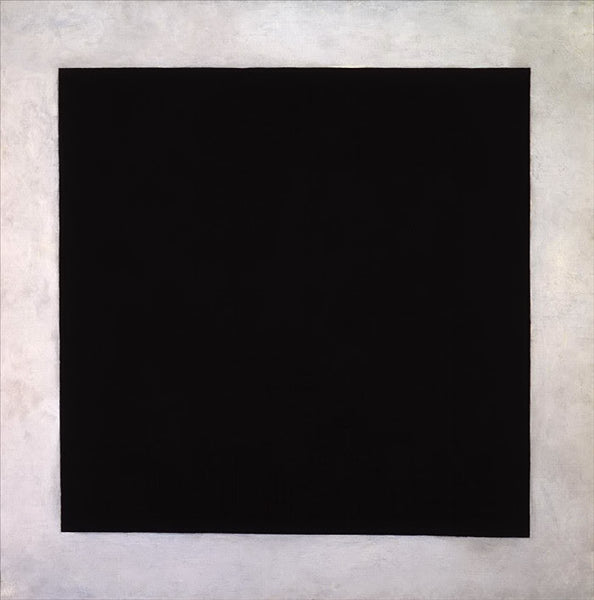Description
Kazimir Malevich, one of the main exponents of suprematism, created in 1923 the work "Black square (second version)", a piece that continues the revolutionary line of its homonymous painting made in 1915. Malevich, through its "black square" , not only broke with the artistic traditions of his time, but also sought to transcend realism and symbolism to achieve a new and purely abstract language.
The work "Black square (second version)" consists of a black square, slightly decentralized, inside a white canvas. The apparent simplicity of this composition is misleading; The edges of the black square are not perfectly straight, but offer subtle variations that indicate the human presence in their stroke, moving away from the geometric stiffness and closer to the manual and personal expression of the artist.
The use of black and white is not fortuitous. Malevich, when choosing these colors, does not simply seek visual contrast, but also a deep reflection on the absolute and the infinite. Black, an impenetrable emptiness, is found in opposition to white, an unlimited space, suggesting a contrasting game between nothing and totality. This contrast of colors, although minimalist, is powerful: black absorbs light and seems to swallow everything around it, while white reflects and expands it, creating an emotional and visual tension in the viewer.
The absence of figures or characters in "black square (second version)" is deliberate. Malevich strips his work of any recognizable reference, pushing the viewer to a purely spiritual and philosophical reflection. By eliminating the representation of tangible objects, it invites a direct aesthetic experience and not mediated by the material world.
As for the historical context, "black square (second version)" is framed at a time of great change and seizure for post-revolutionary Russia. Malevich, at the head of the Supreme Movement, promotes the idea of an art that breaks with the ties of the past and is projected towards the future, seeking a renewal in the perception and function of art.
This work has also been a reason for debates and different readings over time. Some critics have interpreted the black square as a symbol of the abolition of the old and the inauguration of a new aesthetic and philosophical era. Others see in him a gesture of resignation or a comment on the uselessness of art against the political and social realities of his time. However, what is undeniable is that "black square (second version)" remains an icon of abstract art and an unavoidable reference for any discussion about the avant -garde and artistic innovation.
In summary, "Black Square (Second version)" of Kazimir Malevich is a work that goes beyond its minimalist appearance to offer a deep meditation on emptiness, infinity, and the power of abstract art to reconfigure our perception of the world. This piece is a perennial testimony of the Malevich genius and its tireless search for a new visual language.
KUADROS ©, a famous paint on your wall.
Hand-made oil painting reproductions, with the quality of professional artists and the distinctive seal of KUADROS ©.
Art reproduction service with satisfaction guarantee. If you are not completely satisfied with the replica of your painting, we refund your money 100%.

